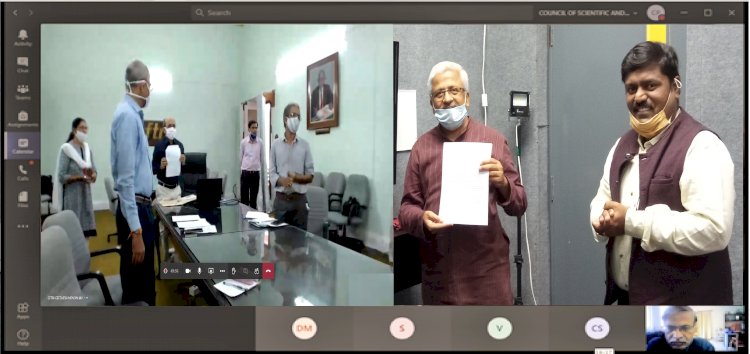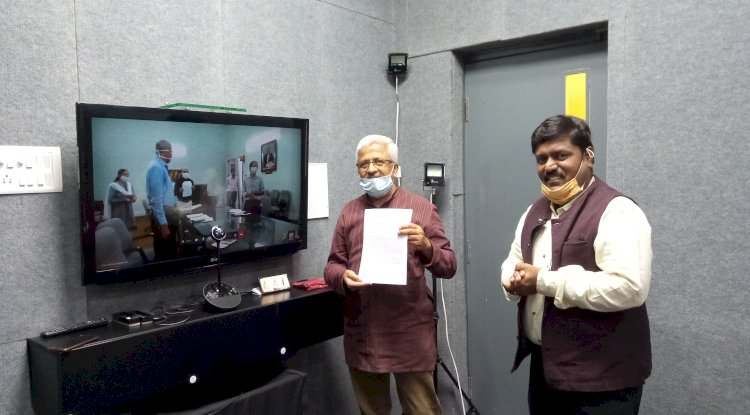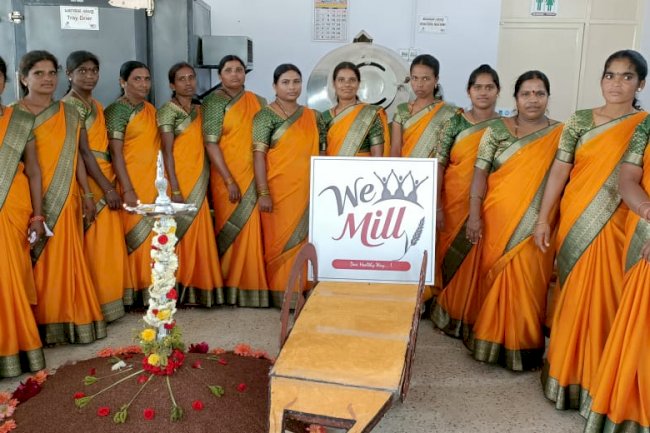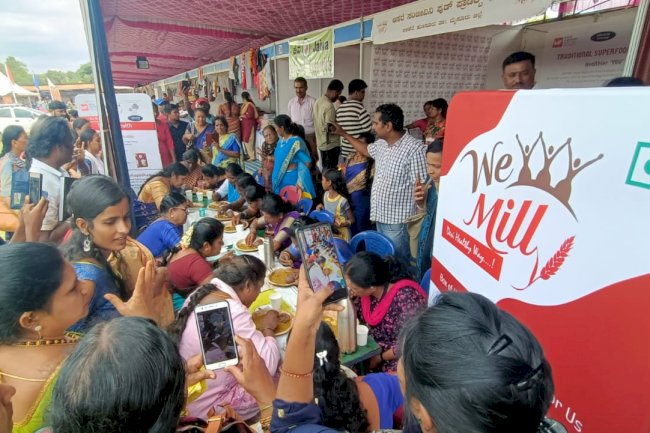GRAAM’S MOU with CFTRI – Adopting technology in building sustainable rural livelihoods
As part of the MOU CFTRI will extend the technical support for planning production units, technical training to the women entrepreneurs, quality assurance, etc. GRAAM, having a rich expertise in developing livelihood models for rural communities based on rural wealth creation principles will handhold the women entrepreneurs with necessary capacity building, training, mobilizing and motivating them to find a sustainable livelihood.

CSIR-CFTRI (Central Food Technological Research Institute) and GRAAM (Grassroots Research and Advocacy Movement) signed a memorandum of understanding (MoU) on 20th August 2020. It was a remarkable day for GRAAM to gear up its rural livelihood initiatives to a cutting-edge. Through this partnership, GRAAM will enable the technology which will result in developing sustainable livelihood models in rural areas. The technical expertise of CFTRI and the philanthropic experience of GRAAM will together create a new lesson in community development. The memorandum was signed on behalf of GRAAM by Dr R Balasubramaniam, Chairman & Founder GRAAM and Dr Raghavarao, Director, CFTRI. During this occasion Dr Basavaraju R Shreshta – Executive Director of GRAAM, Dr R S Matche, - Head TTBD, Shri P. Manilal – Head, PMC, Shri Raghavendra, TTBD department were present. The signing event was held on a virtual platform.
The memorandum serves to provide a framework for understanding and cooperation between the both the institutions in implementing the rural livelihood projects. As part of the MOU CFTRI will extend the technical support for planning production units, technical training to the women entrepreneurs, quality assurance, etc. GRAAM, having a rich expertise in developing livelihood models for rural communities based on rural wealth creation principles will handhold the women entrepreneurs with necessary capacity building, training, mobilizing and motivating them to find a sustainable livelihood. GRAAM also intends to develop a brand for products produced by women entrepreneurs. The project aims at developing a resurgent economy in rural India by adding value to the local agricultural products. The program is expected to benefit the entrepreneurs as well as farmers in the rural areas.
As the first initiative under the framework of this MoU, GRAAM is implementing a social business project in a selected village of Mysuru district. The goal of the project is to support the rural women entrepreneurs to develop a sustainable livelihood. GRAAM will establish a millet-based value-added product manufacturing unit and will handhold the women entrepreneurs to streamline the business functions in a sustainable manner. The project is being supported by the Wuerth Elektroniks a 75-year-old multinational company which is a world market leader in the sale of assembly and fastening materials. WUERTH ELEKTRONIK INDIA Pvt. Ltd. is supporting this initiative under its Corporate Social Responsibility program.
During the program Dr. R S Matche briefed about the MoU, how both the organization will work closely for and assured necessary support from CFTRI with required technology to develop a state-of-the-art processing unit and nutritious millet-based food products with community centric approach. Dr. Basavaraju, Executive Director of GRAAM, highlighted the importance of partnership between a development organisation like GRAAM and a technical institution like CFTRI to impact the rural women and rural economy through such social business models. This partnership will become a catalyst for social change. Shri Manilal – Head PMC mentioned the various initiatives taken by CFTRI by fulfilling the country’s needs and Sustainable Development Goals. He emphasised the importance of this initiative in the pursuit of achieving atmanirbharata as called by our Honourable Prime Minister. .
Dr R Balasubramaniam expressed his gratitude to CFTRI for making the partnership happen. Graam is looking at this partnership as the beginning of a new trend where globally recognized institutions like CFTRI whose work and knowledge base is known all over the world and understand the significance and relevance of taking this to the grassroot of India. GRAAM have exclusive experience in rural livelihood and rural economy and the new concept called fourth sector economy where we look at not just blind profit but ensuring value that gets created for everybody involving in the chain. he mentioned the project will add value to rural women entrepreneurs, consumers, CFTRI, GRAAM, and others those who involved in the project. So the association will be a resurgence of India itself.
Dr. Raghavarao in his remarks said that all of the CFTRI are very much enthusiastic to participate in this program to take the technology to rural areas. Our Prime Minister Narendra Modi Ji emphasizing the rural entrepreneurship that is the stress that is been given and the migrants come to city but current situation is not so conducive to them so these kind of initiative will improve the rural livelihood and GRAAM is contributing to the noble cause so this partnership will stand as special because the project aims to impact the real needy people. He assured the support of the entire team of CFTRI towards the social business initiative taken up by GRAAM in the capacity of CFTRI as well as individually.
CSIR − Central Food Technological Research Institute (CFTRI) is a constituent laboratory established in 1950 under the aegis of Council of Scientific and Industrial Research (CSIR), an autonomous body under Ministry of Science & Technology and Earth Sciences, Govt. of India. CFTRI has been working on the development of various technologies related to food processing and exchange the knowledge with communities to ensure sustainable nutrition and food security of the Nation.
Grassroots Research and Advocacy Movement (GRAAM) is a public policy research and advocacy initiative in India. GRAAM’s extensive expertise spans over policy research, program evaluation, community consultation, policy engagement, strategic consultation, academic programs and community development. GRAAM works in collaboration with all the four key stakeholders of development i.e. Government, Citizenry, Civil Society Organizations and Corporate. GRAAM has undertaken research, evaluation, consultancy, livelihood development and advocacy initiatives in different sectors with a multi-dimensional approach. We are committed to provide efficient and effective services ensuring integrity and transparency with its community focus and multi-disciplinary perspective. The organisation strives to impact development through building human and social capital.

What's Your Reaction?





















